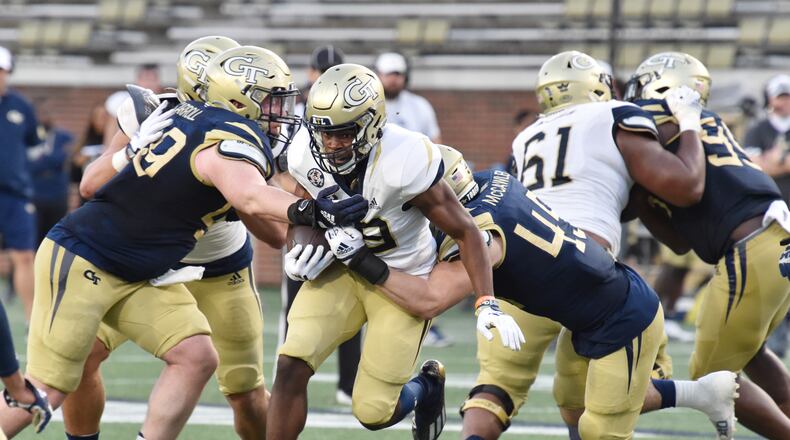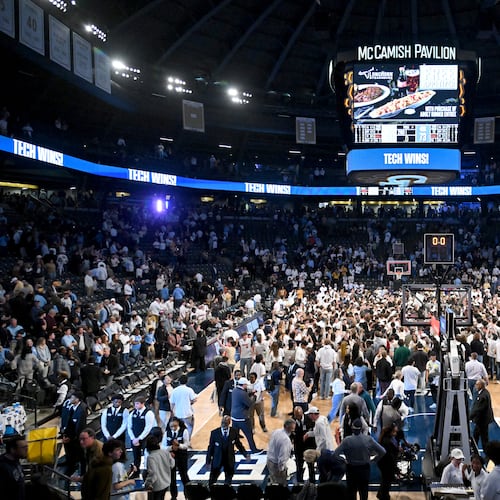The potential for Georgia Tech athletes to earn money off their name, image and likeness is about to increase.
First, a collective – a group of supporters pooling their money together to create NIL deals for college athletes – is close to beginning operation to support Yellow Jackets athletes. Second, multiple Jackets boosters are in the process of creating their own NIL deals with different position groups on the Tech football team.
“Certainly, it’s the reality of collegiate athletics these days,” Tech donor Gregg Garrett told The Atlanta Journal-Constitution. “We want to compete, we want to be good, we want to be competitive and we want the student-athletes to be compensated in order to achieve that. It’s exciting.”
Garrett said he expected the rollout of the collective “to be within a matter of days, not weeks. I think they’re very close on that.”
“We want to compete, we want to be good, we want to be competitive and we want the student-athletes to be compensated in order to achieve that. It's exciting."
The Tech collective – which, as per NCAA rules, will operate apart from the school – is expected to be in support of all Tech athletes, although likely it would start with the more prominent teams and athletes. In collectives for other schools, athletes are compensated for activities such as personal appearances, autographs and youth coaching sessions.
Collectives have become a part of the NIL landscape in the past several months after the NCAA made it permissible for athletes to be compensated for the use of their NIL starting last July. They typically are formed by groups of a school’s supporters to help create NIL deals for the school’s athletes.
They can differ from the sorts of NIL deals that have been common, such as a restaurant or clothing line paying an athlete for his or her endorsement, in that the individuals funding the operation are supporters of the school and are likely as or more interested in getting money into the hands of athletes as they are about getting a service in return.
Among notable examples, a collective at Texas announced in December that every scholarship offensive lineman would receive $50,000 annually to support their participation in charitable endeavors.
In turn, collectives have become a significant element in recruiting, as prospects can weigh their NIL opportunities at different schools in making their college decisions.
Garrett’s deal with the offensive linemen, done apart from the collective, will be to promote his company, TeleNet Marketing Solutions, a business-to-business marketing firm.
“They’ll do ads, and we’ll kind of build a promotion as it relates to them and the company,” said Garrett, a co-founder and CEO of the company. “And it’s based on that. TeleNet will provide them some level of income for their help with our company.”
That income – Garrett said it was premature to share figures – is not a small part of his motivation for making the deal. Garrett is one of the Tech athletic department’s most generous donors and a diehard Jackets fan.
“It would be naive or disingenuous to say that this was just about TeleNet helping TeleNet,” Garrett said. “Certainly, that’s part of it, but the NCAA now allows us to do this, and, as you know, being a proponent of the program, I want to play a role in making this happen for our student-athletes. Certainly, that’s a big part of it.”
Garrett expected the deal with the offensive line to be completed by the end of April. He has been in communication with offensive line coach Brent Key and administrators in the athletic department.
“I guess what I’m trying to say is this is beyond discussion and due diligence,” he said. “We’re in the executing phase of it.”
Garrett said that as he and other supporters of the team had considered different strategies for NIL, the idea that they landed on would be to compensate them as position groups.
“There’s nothing that requires people to just pick a position group, they can pick a player or whatever they want to do,” Garrett said. “There’s a group of us that thought this made the most sense from an approach standpoint.”
Garrett also called it “a very realistic expectation” that every position group will have an NIL deal by the middle of the summer. The running backs group already has entered into a contract with KetteQ, an Atlanta-based supply-chain software company. Jackets running backs will take part in a meet-and-greet with supply-chain executives, undoubtedly many of whom are Tech alumni.
Men’s basketball coach Josh Pastner said no similar deals have been arranged for his team. But he encouraged interested parties to contact him.
“We have great young men, really good people, really good players,” he told the AJC. “They’re Georgia Tech. Any NIL opportunities for our current student-athletes, send me an email at jpastner@gatech.athletics.edu. It goes personally to me, and I will make sure compliance is involved so everything is on the up and up. And you can also email me if you want to talk about our offense or our defense or if you know of any great recruits out there that you have connections to.”
About the Author
Keep Reading
The Latest
Featured



